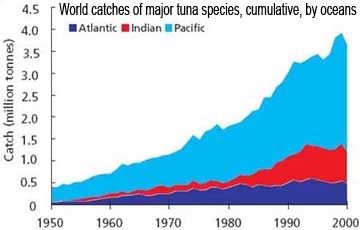World’s first sustainable tuna fishery certified
World’s first sustainable tuna fishery certified
WWF news release
September 9, 2007
The world’s first certified sustainable tuna fishery was announced today, a move that could help save one of the world’s most valuable fish — and the fishing industry that relies on it — from extinction.
The American Albacore Fishing Association (AAFA) based in San Diego, California, has been officially certified by the Marine Stewardship Council, an independent standard-setting organization that ensures fish are caught according to strict methods that avoid overfishing and bycatch (the unintended capture of other fish, seabirds and marine mammals).
WWF sponsored the assessment of the fishery, hailing the move as a hopeful sign for dramatically declining tuna stocks, fishing livelihoods and food security.
 World catches of major tuna species, cumulative, by oceans, 1950-2000. Graph courtesy of FAO. How to save the world’s oceans from overfishing Global fishing stocks are in trouble. After expanding from 18 millions tons in 1950 to around 94 million tons in 2000, annual world fish catch has leveled off and may even be declining. Scientists estimate that the number of large predatory fish in the oceans has fallen by 90 percent since the 1950s, while about one-quarter of the world’s fisheries are overexploited, depleted, or recovering from depletion. Unsustainable fishing practices like bottom-trawling and some forms of long-lining not only deplete targeted species, but net sea birds, turtles, and other marine life, while destroying delicate ecosystems like deep-sea reefs. About one quarter of global fish catch is tossed back overboard, dead or dying, as bycatch.
|
“If we want our grandchildren to have tuna on their dinner plates and in the sea, sustainable tuna fishing practices must be adopted,” said Meredith Lopuch, Community Fisheries Programme Director with WWF-US.
MSC milestone
The AAFA tuna fishery is a small, family-run fishery operating out of San Diego. Its members pride themselves on the care they take to protect the marine environment.
“Tuna fishermen seem to get a bad rap in a worldwide way,” said Skipper Jack “Bandini” Webster.
“Most of the fishermen who are left love the ocean. You’ve got to love it because it’s real hard work. Being certified sustainable is important to us. Fishermen who are doing the right thing should prove that they are and talk about it. That’s what this certificate is all about.”
Consumers will be able to buy the MSC-certified tuna in stores nationwide later this year.
“This really is a milestone event and one that demonstrates the applicability of the MSC programme to migratory species,” said Rupert Howes, Chief Executive of the MSC.
“The certification of the AAFA tuna fishery is a huge achievement for the fishermen. By demonstrating their sustainable practices through MSC certification, AAFA is making it possible for consumers to make the best environmental choice in tuna.”
Threatened stocks
With an export catch valued at US$5 billion in 2002, the world’s tuna fisheries are facing a number of urgent problems — declining stocks, poor fishing management and regulation, and significant bycatch — that threaten their survival and endanger wider marine ecosystems.
Currently, all 23 commercially exploited tuna stocks are heavily fished, with at least nine classified as fully fished and four more classified as overexploited or depleted. Three are considered Critically Endangered, three as Endangered, and three as Vulnerable to Extinction.
Together, the seven principal market species — albacore, Atlantic bluefin, bigeye, Pacific bluefin, skipjack, southern bluefin and yellowfin — are the single most important resource exploited on the high seas, accounting for over 7% of total marine capture fisheries production and 11% of the total value of fish landings for consumption.
With 21 vessels, AAFA harvests about 30% of albacore tuna caught using the troll and/or pole and line method in the North Pacific. The troll and/or pole and line method avoids bycatch.
In contrast, tuna long-line fisheries deployed some 1.2 billion hooks in 2000 alone, capturing and killing many non-target species including seabirds, sea turtles, marine mammals, sharks and other fish. Long-line and purse-seine fishing methods account for nearly three-quarters of global tuna catches.
“Certification of the first sustainable tuna fishery shows it can be done,” stressed Lopuch.
“If others change to improve their practices and follow suit, there’s a future for tuna and tuna fisheries.”













